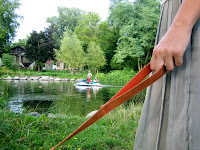“I crashed down on the crossbar
And the pain was enough to make
A shy, bald Buddhist reflect
And plan a mass murder.”
-“Stop Me If You Think You’ve Heard This One Before”
-The Smiths
We had come to see Morrissey at what seemed most non-corresponding venue in the world.
Myrtle Beach’s House of Blues is a compound. After passing five miniature golf courses and at least six versions of Wings, that family mart of all things beachy*, you come to a light where there’s a swampy, overgrown ex putt-putt course on your right. You then hang a right off the main road onto an access road and drive through a Siberia of parking lots. Past Dicks, that tourist restaurant chain where waiters are mean to you on purpose, a Florida-pink Hampton Inn and further in still, where you finally park, across another giant expanse of parking lot from the Alabama Theater, which I think is the rough equivalent of House of Blues for FM country music. You park and you walk and you are subsumed.
HOB is a fortress covered in a cosmetic varnish of folksy appeal so insistent it becomes its opposite. It’s advertising itself. Corporate folksy appeal. I’m telling you, The House of Blues sports more Howard Finster than Paradise Gardens in Georgia. It’s made to look like a tin jukejoint, only some of the folksy signs are painted with messages like, “No cameras inside. We will confiscate.” We sat and ate sweet potato fries and quesadillas at a table in the behemoth restaurant, because they told us if we ate there, we’d be let in earlier and get better seats. I had wanted to order the Blues Burger, but I was stopped by the price combined with the idea of Morrissey fans truer than I—which are most Morrissey fans, actually—shooting me “Meat is Murder” glances. It felt like the start of fan one-upsmanship that undergirds some element of the experience of seeing a show, or did to me, because my extent of knowledge of Morrissey and the Smiths runs to about fourteen of their billion-song oeuvre. To say you are a Morrissey fan feels to me like saying that you hated your mother in high school: It feels like a cliché just to say it even if it’s true, and it is true, to some extent, for many people within three decades of my age. In a way, dining at the restaurant was like a return to high school. Everyone stared at one another. Who were these other people, we all wondered, these Morrissey fans who were Morrissey fans enough to buy tickets and drive to this place and sit, now, here, and wait, sipping Cokes and bobbing their heads a little now, to the sounds of BB King and the Staple Singers?
The staff of HOB is legion, and they are not happy. Our waitress worked with the dull knowledge of a night of poor tips ahead. The man we asked the location of the bathroom when we first arrived pointed it out with a dutiful sigh. Workers in black-and-bright-yellow shirts stood around in unhappy clumps in the bar/courtyard between the entrance to the restaurant and the ticket window. My friend tells me there was an attendant in the other bathroom, and that she looked grim. A scowling woman directed us to the Special Restaurant Diners line. Then an older man, less unhappy, took our receipts and gave us special orange wristbands, for being restaurant diners.
Their misery was, of course, oddly fitting.
We got in line with everyone else, diners and non-. We stood for a long time as the line grew, winding around a log-cabinish ramp (here, the painted “No cameras/We will confiscate” sign). Minutes and more minutes passed. We shivered in the not-quite-spring-yet air. Several recorded announcements came on about what was and what wasn’t allowed inside. Two slightly cross men came and metal-detected everyone and endured the lame quasi-racist "We're not gangsters" jokes of the men in line ahead of us. For some reason, they collected people’s spare change too, which also was not allowed inside. At the door, two more workers confiscated drinks people had purchased outside. When we went to order more at the bar, the two bartenders were having a loud argument. The woman-bartender slammed the small fridge. “I don’t even wanna hear about it,” she said to the man-bartender before turning on her heel and facing me. “Yes?” she said.
My friend and I went and stood in the crowd before the stage. We were a mixed group, wristbandwise. It seemed the restaurant perk thing had been a ruse. Two more announcements came on, about emergency exits and proper behavior. There in that big crowd, my sympathies with cattle felt stronger than ever. It had been at least two hours of measured steps of submission. Despite this, it was beginning to feel more like a show. There was a crazy guy shouting things into the crowd. My friend, who loves Morrissey, bounced up and down on the balls of her feet in anticipation.
The man himself, when he came on, was, of course, just a man. His six-something frame was human flesh that scowled and preened across the stage, that flipped the long microphone cord dismissively again and again, strutting around, his band so far behind him and ignored by him completely, the players indistinguishable from one another in their jeans and tucked-in blue seersuckers, their shorn hair, their polite finesse with their instruments. He was just a man, but he shined. He frowned and he lamented; he beat his chest and pointed and leaned down to grasp the entreating hands from the front rows.
This crowd had paid not only to hear the songs they equated with huge parts of their lives; they had paid to be paid attention to in this precise way. To take part in a show in which the man pretended we were his private mirror. He sang his fictional trials to us--You understand, you understand, he was crying, because no one understood but us, of course; not these seersucker guys; no one. He was all strange sex appeal and raw egotistic need and gentlemanly aplomb; “Thank you so much,” he said quietly after each song, bowing at the ravenous applause.
All of this came down to the giant backdrop, a two-story black and white photo of a young, muscled man circa WWII, flexing his muscles and chomping a cigar. After the show, my friend said, “There was something really comforting in that photo. Something so Smiths about it, you know?” Yes, but blown up to the nth degree, revealed when another curtain in front of it fell with a dramatic flourish before the start of Morrissey’s set and flashing in different shades of foreboding with the colored lights of each song, the giant photo completed the feeling that we were truly at a rally of some sort. And I liked it. The parking lot wasteland and the militant lines, the guards, the timetables and wristbands; all of it had led up to this, so in this way, it seemed fitting as one of his blue-shirted minions swung and hit the heavy gong and the man sang the words, “Life is a pigsty/And if you don’t know this, Then what do you know?” before shifting into the final song, no encore, just the Big Lonely vacuum of “How Soon is Now?” with its strobelike guitar echoed in actual strobes, beating like the promise of violence against the giant face of the young son of war, against our small bodies as we swayed in ecstasy.
(*My friend once spotted what we agreed to be in the Top Five of Worst T-shirts Ever, at a Wings store in the Outer Banks. Beside an illustration of a stripper-pole, the shirt read, “I support single mothers.”)


